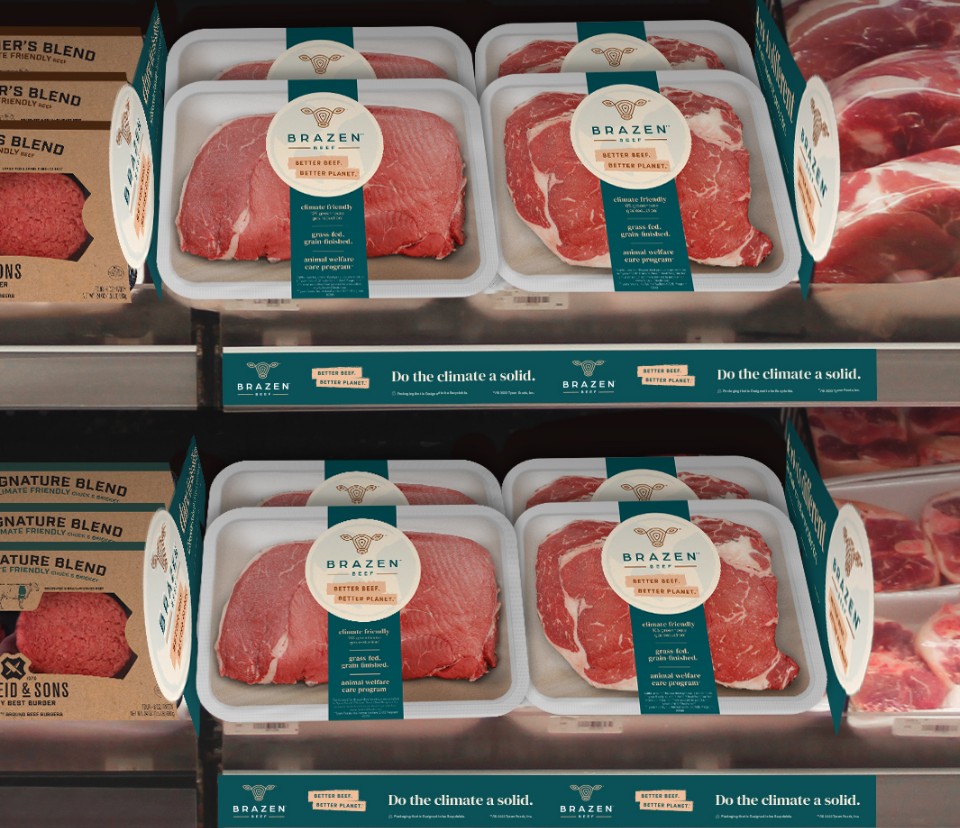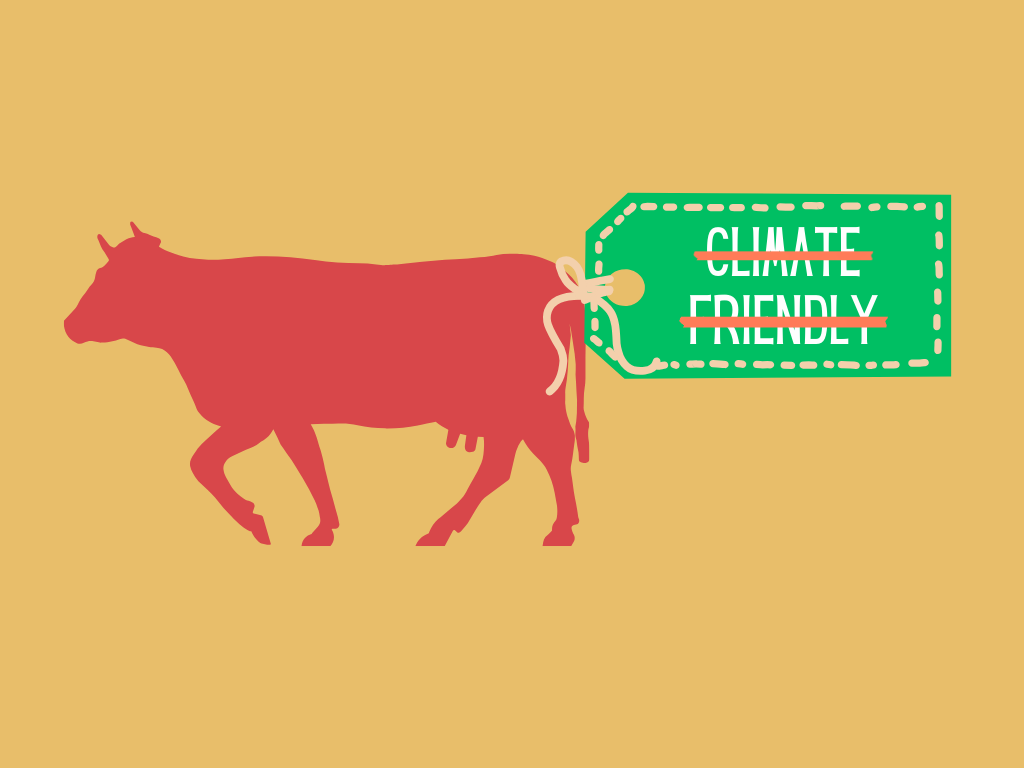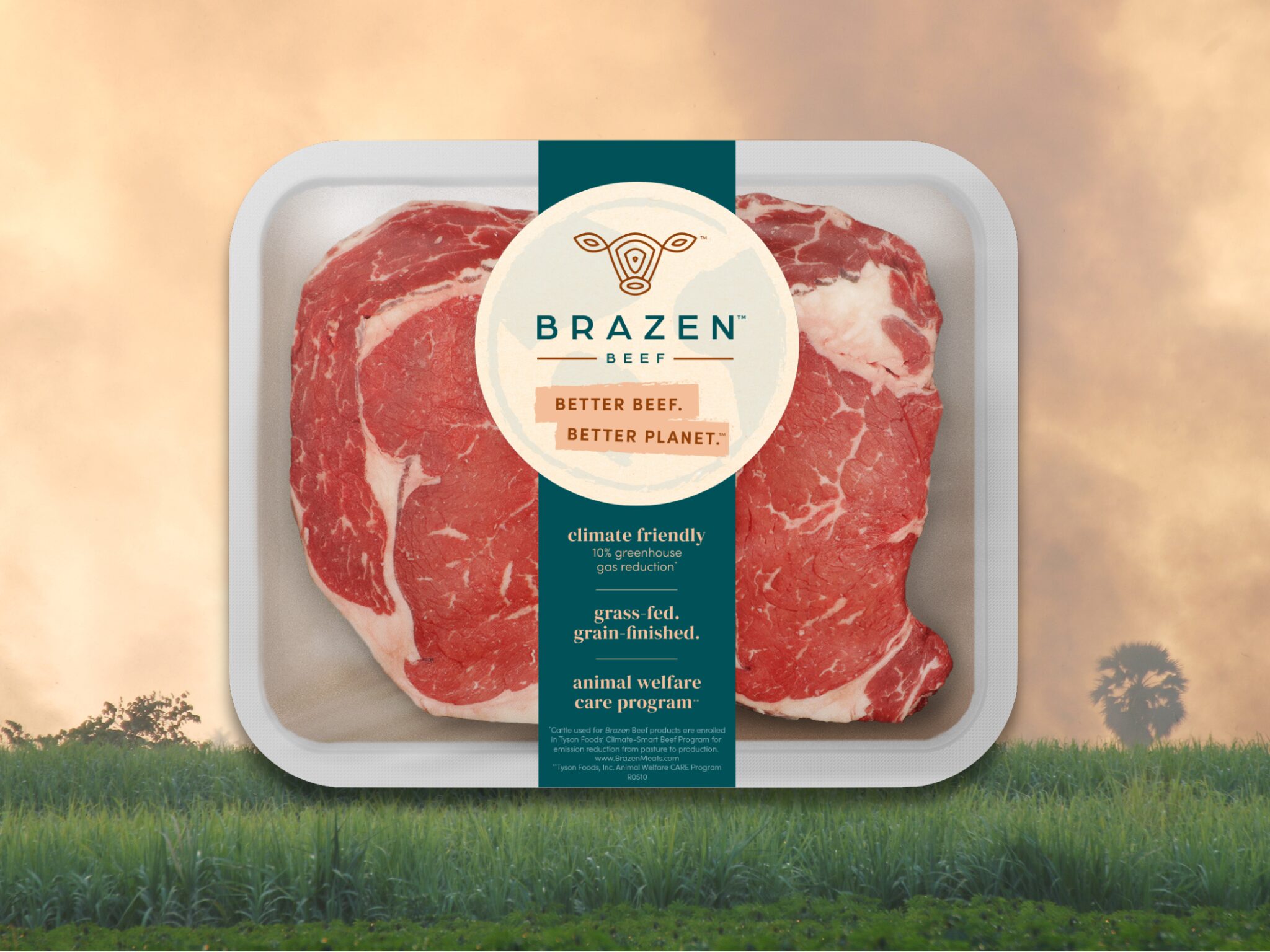Consumers Prefer Climate-Friendly Products, But Are Misled by ‘Low-Carbon’ Meat Labels Like Tyson’s Brazen Beef
5 Mins Read
The majority of consumers would pay more for products labelled as ‘climate-friendly’ or ‘low-carbon’, but the use of these labels on beef packaging breeds misunderstanding of its true climate impact, finds a new study.
In July last year, US meat giant Tyson Foods began retailing its Brazen Beef brand. It was the product of months of research as part of its Climate-Smart Beef Program, resulting in a beef product with a USDA-approved label stating ‘10% greenhouse gas emissions reduction’.
There’s very little information about how Tyson lowered its emissions for the product, but the hope was always to convince consumers that its beef is more sustainable than the rest through its USDA ‘Low Carbon Beef’ label on packaging. And it seems it worked, with people being successfully greenwashed into thinking they were buying climate-friendly beef.
That was the consensus of a study by the University of Oklahoma, where researchers surveyed about 200 people on their attitudes and preferences on carbon labelling.
The idea was that consumers aren’t usually great at estimating the emissions of animal products – and are particularly bad at doing so for beef, which is the highest-polluting food of all. But while consumers tend to underestimate beef’s climate footprint, research has shown that food labels can influence perceptions and understanding of food products, with certain features possibly increasing consumer comprehension.
The researchers note that some labelling conventions – such as traffic-light-style Eco-Scores – can help alleviate misunderstandings over food emissions. For example, a peer-reviewed study of 255 Brits last year suggested that 63% of consumers would be deterred from purchasing meat if it had an Eco-Score in the red, while 52% would consider buying a meat alternative if it had a better rating. At the same time, 58% said they’re interested in eco-labels, but require more information – highlighting the need for more education and awareness.
‘Climate-friendly’ Brazen Beef label misleads some consumers

“There was good theoretical reason to suspect that Brazen Beef’s labelling would not alleviate and might exacerbate misunderstanding of GHG emissions,” the researchers wrote. They designed the survey to explore whether ‘climate-friendly’ and ‘low-carbon’ claims are understood and valued, if they understand Brazen Beef’s label, and if they can accurately guess the GHG emissions of ‘climate-friendly’ beef versus other products.
They found that 95% of people would pick products labelled as ‘climate-friendly’, and 91% would do so for ‘low-carbon’. In fact, 66% said they’d likely pay more for the former, and 57% for the latter. Trust levels are high too, with 87% and 85% having faith in ‘climate-friendly’ and ‘low-carbon’ labels.
The second part of the survey explored whether respondents could identify which food products have the highest and lowest carbon footprints from a list of ‘climate-friendly’ beef, conventional beef, pork, chicken and tofu.
While 75% correctly identified beef as having the highest footprint, 11% didn’t know, and 14% answered incorrectly. Similarly, 58% of respondents correctly believed tofu to have the lowest impact, but 21% were unsure about which food falls into this category, and 15% thought ‘climate-friendly’ beef has the smallest climate footprint of these foods.
The last bit of the study asked consumers to quantify emissions for different food products, with a focus on Brazen Beef, Impossible Beef, ‘low-carbon’ beef, ‘climate-friendly’ beef, conventional beef, chicken, and pork. The researchers found that GHG estimates for Brazen Beef were lower than pork and conventional beef, and higher than Impossible Beef. “These results suggest that people underestimate the GHG of climate-friendly, low-carbon, and Brazen Beef more than people underestimate the GHG of conventional beef – and this difference is statistically significant,” they noted.
Legislators need to tighten up eco-labelling regulations

The research suggested that ‘low-carbon’ and ‘climate-friendly’ labels on beef – including the ‘10% greenhouse gas emissions reduction’ claim on Brazen Beef – will increase the error of estimating the environmental impact of these products. This means consumers are less informed and more likely to be misled by these labels.
This exacerbates the existing problem of a lack of connection between meat and climate change. In the US, where overconsumption of red meat is a huge problem, 74% of consumers don’t think eating meat is linked to the climate crisis. This is despite beef’s emissions being twice as high as the next food on the list, and research warning that Americans must cut their meat intake by 82% if they’re to avoid more climate disasters from occurring in the future.
US animal advocacy group the Animal Legal Defense Fund used the University of Oklahoma research in its comments filed on the Environmental Working Group’s petition to the USDA’s Food Safety and Inspection Service, which asked the government body to prohibit the use of ‘climate-friendly’ or similar claims on beef products. Alternatively, it was suggested that these labels require independent third-party verification, alongside a numerical carbon disclosure.
This could address the lack of transparency of such claims made by beef producers. The USDA uses a benchmark almost 25% higher than the average environmental footprint of beef cattle in the US, which means most American beef can effectively qualify to be climate-friendly. But even if beef products were more ‘climate-friendly’, their emissions still outweigh other products.
Take UK retailer Sainsbury’s ‘lower-carbon’ beef product. According to its own life-cycle assessment, the ‘reduced-carbon’ beef (with 25% fewer CO2 emissions) still emits 74kg of CO2e – this is comfortably higher than dark chocolate’s 47kg of CO2e (the second highest-emitting food). The University of Oklahoma researchers noted that Brazen Beef’s labelling conventions mislead consumers, and pushed for the adoption of alternative methods to communicate emissions data, such as the traffic-light approach.
“Consumers are demanding a change in company practice to truly reduce greenhouse gases and carbon emissions – but what they are getting is a marketing campaign that incentivizes them to pay more for the same environmentally destructive products,” says Michael Swistara, a litigation fellow at Animal Legal Defense Fund. “The animal agriculture industry is taking advantage of the lack of regulation and ambiguity in these ‘climate-friendly’ claims and it’s consumers and the environment that are paying the price.”




